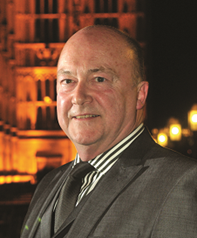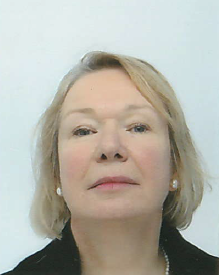Meet our CILEX Judges
Our CILEX Judges
CILEX wishes to celebrate all members (past or present) achievements and so if you are a CILEX member or have been a CILEX member and later dual qualified and have been appointed to the judiciary then please do let us know by emailing [email protected] so that we can help you celebrate your achievement.
Chloe Hubbert – Deputy District Judge
 Chloe Hubbert
Chloe Hubbert
Deputy District Judge
Chloe Hubbert became the second female Chartered Legal Executive to be appointed to the judiciary and the first to become a Deputy District Judge.
Chloe was appointed to the judiciary in 2019 and is a Chartered Legal Executive and associate at specialist family law firm, Selby Lowndes Solicitors in Oxfordshire. She is a Deputy District Judge (DDJ) on the Midlands Circuit. She is a family law specialist with over 15 years’ experience in all aspects of family law including divorce and financial matters, together with private law children cases. She continues her work at Selby Lowndes.
Chloe qualified with the Chartered Institute of Legal Executives (CILEX) in 2006 after training at the Oxford Law Group where she worked on mainly child-related cases and family law injunctions. She moved to her current role in 2015 where she works primarily on a broad range of financial remedy cases as well as some private law children work.
Chloe says, “I am very proud to have been appointed to the judiciary and to be one of the first Chartered Legal Executives to take up a DDJ position. It’s hard work but a great opportunity and I would encourage other CILEX lawyers to consider applying.
Damien Moore – Chairman of Police Appeals Tribunals
 Damien Moore
Damien Moore
Chairman of Police Appeals Tribunals
Damien Moore is a fee-paid Chairman of the Police Appeals Tribunal. He began his career as a solicitor’s clerk aged 19, qualifying as an ILEx Fellow in 2001. He is now a Solicitor-Advocate and partner at Fosters Solicitors.
“I am thoroughly enjoying my position and the challenges which it brings. The first moment I was addressed as “Sir” was a sobering experience and brought home the reality of the appointment. The role really compliments my career at Fosters who have been incredibly supportive. Some of my counterparts have now seen my case study on the JAC website and have asked me about my experience of the process. I have encouraged these people to push forward with their own applications in the knowledge of the fairness of the selection process. I have been able to provide them with guidance and support.
“I now have many months under my belt as a Tribunal Chairman which has given me time to reflect on the selection process. I believe that the JAC really does allow any applicant from any background to have a fair chance of being selected for judicial office should that person possess the correct qualities. It is an incredibly transparent process which allows you to measure yourself against other candidates. Whilst I am not a barrister or a QC I felt that as an experienced solicitor-advocate, formerly a legal executive and having worked in the legal profession since the age of 19 I had many qualities and experiences which I could put forward to support my application. The fact I was appointed underlines the JAC’s fair and upright approach.
“I feel strongly that the JAC should be proud of everything it has achieved over the last 10 years and the real and tangible advancement it has made in the diversity of judicial appointments. I am sure the JAC will continue to move forward positively in the next decade and beyond.
“It’s incredible that in the space of 19 years I’ve gone from being the boy who makes the tea, right to the top. It is an achievement and I do feel proud of that. My career has always been about ‘finding the next challenge’. I’ve always wanted to go one step higher and I feel I have achieved that, which is extremely rewarding. I joined the legal profession when I was 19 as a solicitor’s clerk doing a little bit of everything. Then I went down the ILEx route and qualified as a Fellow in 2001. I became a solicitor in 2004.
“In today’s climate it’s very difficult for young people coming out of university to secure training contracts. The advantage of the CILEX route is that it provides young people with a foot in the door. I think it is now one of the best routes. It is hard work because you are working full time and studying but if you are motivated and you want to get through it then you’ll reap the rewards at the end of it.
“Following qualification as a Fellow of ILEx and then a Solicitor I always knew that I wanted to be a partner. As a partner at Fosters I was provided with the additional role of becoming a branch manager. This brought some new challenges and a new skill set. After three years of this role I was looking for my next challenge. A judicial position seemed to be the next step. The JAC website was my first port of call, without looking at the website I think you would be underprepared. It tells you everything that you need to know and do. Reading the case studies gives you a valuable insight and tips on how to present yourself in the best light. I also spoke to other people who had successfully been through the process and they gave me lots of advice.
“I found the process detailed and challenging but I was also made to feel comfortable. It was very well run and everything went to time so I was calm in myself. The panel put me at ease. I felt relaxed and gave honest answers, rather than answers I thought the panel might want to hear – I was just myself. In giving honest answers the panel saw my character and personality.
“After the exercise I said to my family that even if I didn’t get through I was really pleased I had completed the process and I wouldn’t be put off doing it again. I found it a really positive experience.
“I’m really looking forward to this new opportunity and in particular conducting the hearings. I am excited about having a different role to play – rather than putting forward an argument, actually deciding on the issues in front of you. It’s a different skill set, looking at things very objectively.
“My firm Fosters has been incredibly supportive. They see my role as something very positive for them in terms of having a partner who will now acquire this different skill set. They will ensure I have the time I need to dedicate to the position because they can see the benefits it will bring in terms of personal, professional and business development.
Elizabeth Johnson – District Tribunal Judge – Social Entitlement Chamber
 Elizabeth Johnson
Elizabeth Johnson
District Tribunal Judge – Social Entitlement Chamber
I qualified as a Chartered Legal Executive in 1998. Initially I worked for Beachcrofts, before joining Ashfords eight years ago.
I am now an Associate at the Exeter office of Ashfords LLP, specialising in personal injury and have over 20 years’ experience in all aspects of injury, insurance and liability claims.
In 2017, I took part in CILEX’s Judicial Development Programme, aimed at providing members with information, support, training, mentoring and encouragement when preparing to make their application for a judicial appointment. I wasn’t aware that Chartered Legal Executives could apply to the judiciary until I heard about CILEX’s training programme.
Not being one to shy away from a challenge and after a lot of thought and research, I was confident that I would be a strong candidate!
The support from CILEX meant I benefited from expert advice on how to complete competency-based applications and mentoring from CILEX-qualified District Judge Stephen Nicholls. This support was invaluable in giving me the knowledge and confidence to go ahead.
I am now the first female Chartered Legal Executive to be appointed to the Judiciary, holding the position of a fee-paid Judge of the First-tier Tribunal, assigned to the Social Entitlement Chamber.
I was very excited to be appointed as a Judge, it is a real honour. The application process is tough but I demonstrated that with the right skills and expertise it is achievable. I hope that my appointment will encourage more Chartered Legal Executives, and women, to apply for judicial office.
– As of 14 June, Elizabeth was appointed to the full-time role as a salaried District Tribunal Judge to the Social Entitlement Chamber. You can read the media release here.
Frank Winslet – Deputy District Judge
Frank Winslet
Deputy District Judge
I am now in my 67th year and a retired member of the Bar but continue to sit as a Deputy District Judge having been appointed in 1991. I have a Section 8 ticket which means I am able to hear Private Law cases relating to children.
I attended the Judicial Mentoring Scheme training run by the Judicial College and realised that I fall squarely into what some might say is the “non-traditional background” category. This gave me the idea to share my story about how I became a judge.
I left a South West London secondary school at the age of 15 in 1965. Sadly there was not much hope for me without any formal qualifications. I applied for several apprenticeships but without success. The youth employment officer told me that a firm of solicitors on Richmond Green required an outdoor clerk. I had no idea what a firm of solicitors were let alone an outdoor clerk. It turned out the job of an outdoor clerk back in the sixties was to attend court and issue process.
I spent many hours at Somerset House and the RCJ. At that point in time everything had to be done by hand. I would also attend court to sit behind counsel. The firm was Calvert- Smith and Sutcliffe and had been founded by the grandfather of Sir David Calvert-Smith. The firm at that time was in the hands of his dad known to us all as Mr. Arthur. I would be sent off to appear before the Masters which was very, very frightening.
I recall a hearing in Chancery and it was in camera. When a case is heard in camera it means that the public are not admitted, only the parties and their advocates. Counsel told me to sit outside which I did but I should have been in court. You can imagine what the managing clerk said when I returned. He was not happy as I had no idea what went on. It never happened again.
I enjoyed being in the law and at the ripe old age of 30 realised that if I was going to stay there then I needed to obtain the right qualifications. By then I was married and had a family and mortgage. I started off with the Legal Executive exams and was admitted as a Fellow in 1981. Then the CPE/Graduate Diploma in Law and eventually the Legal Practice Course (LPC) after which I was admitted as a solicitor in January 1984. I should also say I was in debt as I was a full time student in my last year at The College of Law Guildford.
I went from hearings in chambers to a regular advocate in all courts and in 1991 I was appointed as a Deputy District Judge (civil). As a solicitor I obtained my Higher Rights (crime) in 1994 and appeared frequently in the Crown Court as well as making a number of excursions to the Court of Appeal.
At the even more ripe age of 55 I was called to the Bar. I continued to sit regularly as a Deputy and had the opportunity of sitting in a number of London courts where I had all those years before appeared as an outdoor clerk.
During the last few years I have given a number of talks to school children interested in coming in to the law and hopefully shown to them that it is possible to succeed within the profession whatever your background may be.
I am also a mentor on the JAC mentoring scheme for those seeking judicial appointment and taught CILEX studies at South Downs College for some 14 years in Civil and Crime resulting in many students successfully achieving their CILEX qualifications.
So my message to CILEX members is “Yes, you can become a judge.”
Gennaro Baffa – Legally Qualified Chair of the Medical Practitioners Tribunal Service
 Gennaro Baffa
Gennaro Baffa
Legally Qualified Chair of the Medical Practitioners Tribunal Service
Gennaro Baffa was appointed a Legally Qualified Chair of the Medical Practitioners Tribunal Service in June 2019. He Chairs a panel of tribunal members and hears cases that are brought by the General Medical Council against doctors and determines fitness to practice issues. He also sits alone and makes orders following a review of the papers. He applied in January 2019 and was successfully appointed following a rigorous and challenging selection process.
He started work in a legal practice in 1990 for what was meant to be a four week summer experience. Following three of those weeks he was offered the opportunity to stay for a year and then go to university to study law. After nine months into that year he was offered the opportunity to take the CILEX route. He accepted the offer and has never left that practice!
He worked his way up from the post boy, to trainee, to Fellow and then in June 2017 he was appointed as a Director. He specialises in Personal Injury and Criminal Law. He admits that the thought of taking up a quasi-judicial role was both daunting but also “what me, I’ll never make it!”.
The fact that other CILEX members took that path encouraged him to apply. He is a great believer in ensuring that there is judicial diversity. He says “I would like to see those who make these vital decisions come from a diverse background. This doesn’t necessarily mean colour, sex or religion or the traditional barrister/solicitor but is to include CILEX members who have a wide range of experiences both professionally and personally. My parents came from Italy, to this country in the 1960s and brought me up to work hard, treat everyone fairly and don’t give up on your dreams.”
He acknowledges that having the responsibility of making a judicial decision is a privilege and needs to be respected. He encourages other CILEX members to consider such a role.
Graham King – Fee-paid Judge of the Employment Tribunal
 Graham King
Graham King
Fee-paid Judge of the Employment Tribunal
In October 2021 Graham King became one of the first CILEX lawyers to be appointed as a fee-paid Judge of the Employment Tribunal. Aged 37 at the time he was also one of the youngest members of CILEX (the Chartered Institute of Legal Executives) to take up judicial roles.
Graham King is a CILEX Fellow and currently works in contract law for Lyons Davidson in Bristol. He began his legal career specialising in defendant personal injury claims, qualifying with CILEX in 2013 whilst working at Morgan Cole.
Alongside his legal career, Graham spent 12 years sitting as a magistrate as well a working as a funeral director for a number of years before returning to the law in 2019.
In 2020, he took part in CILEX’s Judicial Development Programme, aimed at providing members with information, support, training, mentoring and encouragement when preparing to make their application for a judicial appointment. He was mentored by HHJ Mark Horton of Bristol Crown Court.
Graham says, “I am immensely proud and pleased to have recently been appointed as a Fee-Paid Employment Tribunal Judge, and also as a Fee-Paid Judge of the First-tier Tribunal, assigned to the Health, Education and Social Care Chamber. A career in the judiciary has long been an ambition of mine and it will be a real honour to be one of the first CILEX Fellows to sit as an employment tribunal judge. The application process is tough but with the right skills and expertise – in my case acquired both through working in the law and outside it – it is a goal that is well within reach for many CILEX lawyers.
“CILEX’s training programme meant that I benefited from expert advice on completing competency-based applications, with valuable support from my mentor, Mark Horton. I hope we see many more CILEX lawyers taking up the opportunity of a judicial career and would like to see the bar on CILEX lawyers applying for positions above district judge level removed so that those with the skills and ambition to reach the most senior levels of the judiciary can progress even further.”
Ian Ashley-Smith – Deputy District Judge
 Ian Ashley-Smith
Ian Ashley-Smith
Deputy District Judge & Consultant
I qualified as a Fellow of the Institute of Legal Executives in 1981, but have been employed in the legal profession since 1969, originally as an outside clerk. Qualifying as a Family Mediator in 1996, I became one of the first Legal Executives to be appointed to the Law Society’s Family Law Panel. I am also an accredited Civil and Commercial Mediator.
I was appointed as a Deputy District Judge in August 2010 and I am authorised to hear civil, family and private law cases and I am now authorised to hear Chancery cases in the specialist lists at the Central London County Court.
I left school at 16 with a few O levels and got my first job in law as an outside clerk working with Judge & Priestley in Bromley in 1969, I think it was.
Working my way up, my brother introduced me to the Institute of Legal Executives. I enrolled and studied for my exams by means of correspondence courses (now called distant learning) and eventually I qualified as a Fellow of the Institute.
At my age, 66 next birthday, I am no longer employed full-time in the profession. I am a Consultant to a local firm of Solicitors that I helped start some years ago. This means I can sit pretty much as often as I am required. The ever increasing Court workloads with the prevalence of litigants in person and the absence of Legal Aid means that I am frequently offered the chance to sit as a Deputy.
This current financial year, for example, I am pre-booked to sit mostly at Canterbury County Court for about 100 days. I enjoy sitting as a Deputy. It is totally different from fee earning, but I recognise it is not for everyone.
You have to be your own man (all references to the male gender include the female gender and vice versa) and sometimes it can be a rather solitary job which is a consideration for all those of you who are thinking of applying for an appointment. However I have children and grandchildren and so the odd bit of solitary is not entirely unwelcome!
If you think you have got what it takes, I advise you to apply as soon as the opportunity arises. The selection of Deputy District Judges is an interesting process but one that you have to take seriously. No half-hearted attempt will succeed. I think I spent a week, at least, completing the application form. This is a document that requires careful completion given the criteria. JAC website is a mine of information in this regard.
Just a word about the Institute, the Officers and the Members of the Institute, past and present. The Institute has performed miracles in getting the recognition that the Institute and its Members deserve, but there is still prejudice out there. For example I still cannot join my local Law Society – they will not have me because I am not qualified!!
Members of the Institute have taken the opportunities provided by the Institute in the way of education and personal advancement and so the Bar and my Judicial colleagues have a high regard for the Chartered Legal Executive as a result. Let no-one think however that the Legal Executive route into the profession is an easy option. It is the opposite. I take my hat off to our Members, who in many cases have worked, brought up children and studied at the same time to attain the qualification of Fellow of the Chartered Institute of Legal Executive.Well done to you all, that cannot have been easy.
Lesley Smith – Upper Tribunal Judge
 Lesley Smith
Lesley Smith
Upper Tribunal Judge, Immigration & Asylum Chamber
Lesley Smith is a full time Judge of the Upper Tribunal, Immigration and Asylum Chamber. She was previously a fee-paid Lawyer Chairman of the Residential Property Tribunal, and a senior Government Lawyer with the Treasury Solicitor’s Department. Lesley is a former ILEX Fellow.
“I come from what is an unusual background for the salaried judiciary but there are more and more people coming from different backgrounds. I am often approached by others in the Government Legal Service to discuss or give talks about being a judge, which shows the increased interest in this route whether on a part-time or full-time basis.
“I did not do a law degree at university – I studied French – and was not sure what I wanted to do afterwards. I started off in banking and hated it. My whole family were civil servants and I ended up going down that route. I put the Treasury Solicitors Department (TSol) as an option on my application form because I had learnt some law as part of my banking exams and enjoyed it. It was the time of the Crown Proceedings Act, which allowed people to sue for personal injury, and TSol were looking for people. I knew very little about the law, courts, or claims and arrived to find I had 60 cases to handle. That was 34 years ago.
“The main reasons why I started to train as a legal executive, rather than a solicitor, were that I was not sure where I wanted my career to go at that stage and I was also married and had a mortgage, so going back to college full-time did not really appeal.
“I did it the long way – everything by correspondence and part time – and it took me about eight years. You could not join the Government Legal Service (GLS) as a legal executive at that time (the position has changed since). I also found out that back then, if legal executives decided to go on to become a solicitor, they did not need to do a training contract. So I made sure I did the right legal executive exams to get the exemptions for the Legal Practice Course (LPC), and then studied for the LPC at Nottingham part-time over 2 years.
“I eventually became a Deputy Director in TSol – a management position – and as much as I enjoyed it, it was not what I became a lawyer to do. My friends said I was a frustrated barrister and being a litigator, I always loved being in Court. So I began to look for other options.
“I had focussed on immigration law for 10 years, so becoming an immigration judge was the obvious thought – but I couldn’t because of the conflict of interest with my day job. I had also done some housing law for TSol in the past, and therefore my route into the judiciary was through becoming a Fee-Paid Lawyer Chairman of the Residential Property Tribunal (now the First-tier Tribunal, Property Chamber).
“There was a good mentoring scheme in the tribunal where you sit a few times as a ‘winger’ on the tribunal panel, alongside another judge. I worked for the tribunal one to two days per month.
“I started my current role in 2015. It was a steep learning curve, particularly not having sat in the First-tier of my current Tribunal; although the area of law is familiar to me, the processes in the First-tier Chamber were not. I enjoyed the challenge and was surprised how easily I fitted in. Some people say that judicial roles are lonely. I have not found that to be the case at all. All the other judges and tribunal staff are very friendly and helpful. The work is mentally demanding but that is what I wanted. All in all, I am really pleased that I went down this route and I am thoroughly enjoying my (now not so new) career.
“Having been a public lawyer in Government, there are many skills which I consider to have been invaluable in my judicial career. First, working in public law in Government gives one a very clear understanding of and solid background in the principles which apply equally to judicial roles. For example, a duty to act fairly, to consider all relevant evidence and to make a decision which is rational. Second, having been a litigator, I had a long background in running cases. Whilst the way in which a case is put forward is of course for the parties, those skills translate to case management in a judicial role. Third, similarly as a litigator, I had plenty of experience of drafting documents (witness statements and the like). That experience has helped me in my drafting of decisions. Finally, I had many years of management experience as a lawyer and senior civil servant in Government. That experience has been very helpful in the handling of hearings before me. There is surprisingly very little difference between managing staff and managing those who appear before you as a Judge!
“Law was not a subject on offer at the school I attended. I had no idea I would be interested in it until after I left university and it was largely a matter of accident (or perhaps fate) that I ended up in what was essentially a legal role when I joined the civil service. Probably the greater influence thereafter in terms of my personal background was friendships with people who were accomplished lawyers, many of whom have ended up as judges. It was through them that I gained in confidence in my legal abilities and came to realise that judges are really just ordinary people. Those of my friends who became judges encouraged my judicial ambitions and were always willing to act as referees.”
Case Study taken from JAC Website as part of their Pathways to the Judiciary series
Nick Hanning – Deputy District Judge
 Nick Hanning
Nick Hanning
Deputy District Judge
Nick Hanning, a former Chartered Institute of Legal Executives (CILEX) president and council member has been appointed to the judiciary.
He has been appointed a Deputy District Judge and assigned to the South Eastern Circuit in addition to his current role as a Road User Charging Adjudicator which he began last year. Nick, a Chartered Legal Executive, has practised in personal injury and employment law for over 30 years. He is currently an independent consultant and specialises in work-related psychiatric injury claims.
He was a CILEX Council member for 10 years, currently sits on the CILEX Regulation Board and lectures on occupational health. He serves on the Civil Justice Council Working Party on Access to Justice for Those Without Means and on the Civil Justice Council. He is a member of the Litigant in Person Judicial Engagement Group, chairs the South West Legal Support Trust and is a Trustee of Advocate.
Nick Hanning says, “I am very proud to have been appointed to the judiciary and to be taking up a DDJ position. The competition is fierce but CILEX lawyers are just as capable of meeting the criteria as any other lawyers so I would encourage other CILEX lawyers to consider applying.
Philip Rogers – District Judge
 Philip Rogers
Philip Rogers
District Judge
Philip Rogers is a district judge based in Norwich a former trainer at the Judicial College, editor of the Consumer Credit and Consumer Law sections of the White Book and Mentor to CILEX members taking part in the CILEX Judicial Development Programme. He is a former CILEX Fellow, solicitor and barrister.
“I studied at a secondary modern school in Norwich and left at 16. The career adviser mentioned there was a role called a legal executive, which might be something I would be able to do.
“This was the mid-1960s and my parents could not afford to support me at university. So I started in the back office as a junior clerk and took the legal executive exams on half-day release at the local college. I became fascinated with the law and rather dedicated to study. I still have my Associates and Fellowship certificates.
“In those days legal executives could not become partners. You could not therefore get to the top – although there were some Legal Executives in the middle ranks – and that is why I qualified as a solicitor. You were not given managerial responsibility and you worked in a specialist field to which you were dedicated. I was a personal injury specialist.
“I qualified as a solicitor through a correspondence course and eventually went on to become the senior partner of a firm I set up in Norwich which has now celebrated its 35th anniversary.
“Running a practice requires much administration time and I eventually began to feel rather more of a manager than a lawyer. I decided to go back to being a lawyer and to transfer to the bar. I obtained a tenancy in Lincoln’s Inn and continued mainly to specialise in personal injury cases. Five years on I was appointed as a judge – initially as a fee-paid (part-time) deputy district judge – and I have now been in the full-time judiciary for 18 years. I retire from the full time bench at the end of June and have been appointed a Deputy to continue on a part time basis for the foreseeable future.
“Along the way I also qualified as a chartered arbitrator, which involved me serving as a pupil to a civil engineering arbitrator. I learned many skills from him which have served me very well over the years.
“When I was called to the Bar, I was asked what took me so long to get there. I was rather flattered by this comment as I had not recognised until then quite what a scenic route I had taken. It had taken me years of working until 10 or 11pm in the office or studying, which was really quite tortuous and needed a lot of energy.
“But I had a family, earned a living and was entirely self-sufficient. I also learned a lot of life skills that I would not have gained otherwise; my route was rich in its experiences.
“As a district judge, I have found it useful that I started out interacting with all kinds of people and this has enabled me to understand people coming before me. I understand where they are coming from and how best to handle the situations which arise.
“Parties coming before a court often conceal the real problems and I feel I can get underneath that more quickly due to my background. As a district judge you are very much at the coalface – you have to get to the nuts and bolts of the case and that is an acquired art.
“It is quite right that CILEX Fellows should apply for judicial appointment. I am pleased that after all these years they have been given the recognition they deserve. They are professionally qualified and it is not an easy route.
“It is just a matter of time before more CILEX Fellow judges come through. Not everyone will want to do it – many are very happy in their current role – but this is a question of choice of work rather than ability. CILEX Fellows’ technical work is often of a higher level than that of other lawyers and there are very few general practitioner solicitors now; so Fellows should not have concerns about being too specialist.
“I am honoured to have been invited to act as Mentor to those CILEX members interested in becoming members of the Judiciary through the Judicial Development Programme. I have certainly found my role as District Judge rewarding and an office where it is possible to make a real difference in fulfilling public service.
Simon Lindsey – Deputy District Judge
 Simon Lindsey
Simon Lindsey
Deputy District Judge
I was appointed as a Deputy District Judge on the South Eastern Circuit in 2013. CILEX has had a very successful few years with opportunities for partnership, judicial office and running your own business.
I am presently a Partner at Horwich Farrelly Solicitors primarily engaged in occupational disease, employers’ and public liability claims on behalf of insurers.
I first started in the law back in 1980 directly from 6th Form college which may be unusual now but it was a fairly typical path at that time. There has in many ways been a return to this level of entry to the profession. The market is contracting and with training contracts now so difficult to find, CILEX represents a genuine alternative route into the profession. At Horwich Farrelly we operate a sizable apprentice scheme with a view to developing careers within the firm.
I would encourage anyone interested in judicial appointment to apply, however, the process is one which requires some thought and preparation even before the selection exercise is launched. The Judicial Appointments Commission (JAC) website has a lot of useful information as do a variety of JAC events around the country. It may also be worthwhile arranging to sit with a full time judge for the day. Additionally please do not have an expectation to be appointed on first application, this is unusual.
I was appointed on second attempt. Because selection exercises do not arise every year appointment has to be seen as something of a long game. The application form itself is a critical document which requires careful thought, it may that important competencies are not experienced in our work but may arise in other aspects of our lives. If relevant then it is quite in order as I did to draw on other relevant experiences. The written exam again is quite a challenge but it is intended not to favour particular experience in one area of specialism.
One mistake I did make was not to tell my firm that I was applying for appointment this resulted in some hurried negotiations rather late in the day. This is a difficult area but it is well worth thinking about and planning for.
I presently sit between 30 and 40 days a year, being based in Southampton I tend to travel to courts as diverse as Brighton, Guildford, Staines, Dartford, Reading and Horsham. To anyone with an interest I would encourage them to apply, the Judicial role is very different to the work we do in the office although I am sure my advocacy skills have much improved.
Stephen Nichols – District Judge
 Stephen Nichols
Stephen Nichols
District Judge
Stephen Nichols is a District Judge (Civil) appointed to the South Eastern Circuit. He was previously a Deputy District Judge while working in private practice. He began his career as a CILEX Fellow before becoming a solicitor.
“Since I was appointed, as in any busy occupation, the time has seemed to pass by quickly. I have been exposed to nearly all areas of law. As a solicitor, one generally specialises. I was no different.
“It has been a very steep learning curve and there is something new to be learned every day. There is great satisfaction in assisting people to resolve their disputes, which is a large part of the work, particularly in family law. I have found added confidence, having been in post for more than a year. The camaraderie in the District Bench is second to none. The work is interesting and, most importantly from a judge’s point of view, enjoyable.”
We first spoke to Stephen just after his appointment as District Judge. We asked about his career path and how he used his prior experience of the selection process second time round.
“When I began my career as a CILEX Fellow I didn’t for one moment think I might one day become a District Judge. When working as a solicitor, I applied to become a Deputy District Judge in order to find out more about the process and was surprised and delighted to be successful. I sat initially once a week. It was possible to do this because I was the owner of my own firm and I had very good quality staff that I could rely on working for me.
“When I moved to a new firm I reduced the sitting frequency to once a month. There is a tension between a busy practice and sitting as a judge but my firm welcomed the judicial point of view which I was able to bring in. As a result of this extra dimension the work my department prepared focused on what I considered a judge is expecting to see. To be fair, as a busy practitioner you do have to put yourself out and make time to cover everything. But that is all part of being ambitious.
“When I was appointed a deputy judge in 2001 the application process was very different – it was tough but now the JAC has refined the process to a point where in my view it is absolutely fit for purpose. The focus now is on looking for specific qualities in candidates who are also expected to be able to demonstrate appropriate abilities and relevant experience.
“This was not my first application for a full-time appointment. I learned from previous experience and applied this cumulative knowledge together with the helpful interview feedback given by the JAC. What is needed, in both the application form and at the interview, are specific examples of the particular qualities and abilities required for the post, so my approach was to concentrate on getting that right. If you generalise you are not giving any real indication of how good you are at what you are applying for. I was glad to be able to do the qualifying test online. I took the test from the comfort of my own office early in the morning. There is a strict time limit and you have to work swiftly. All aspects of civil law and procedure are covered.
“The JAC front of house staff were especially helpful on the selection day. They were careful to explain very clearly what would happen. My experience was that, at interview, one’s knowledge of law was presumed to a great extent. My advice to other candidates would be to concentrate more on what might be asked by the lay panel member. They look at a really diverse selection of areas and here I drew upon my experience as an advisor at the Citizen’s Advice Bureau where I’ve met and mixed with a diverse range of cultures.
“The interview also involved some situational questioning which really added an element of realism. It focuses the mind upon what you would be doing day to day as a District Judge. The answers that you provide also give the panel food for thought for further questioning.
“I would certainly recommend this career path to any CILEX Fellow. I found that taking this route gave me a very good practical grounding. I was able to study and gain work experience at the same time. There is a real advantage to doing it this way, and of course, today CILEX Fellows can apply for a number of judicial roles in courts and tribunals.”
